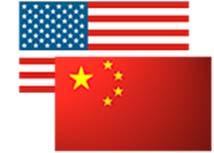ROUNDUP: China: Rich nations should pay for pollution from exports
 Washington - The world's wealthiest nations should pay for China to cut its pollution coming from exports, Chinese officials said Monday amid sensitive talks with the United States on how to reach a new deal to combat global warming.
Washington - The world's wealthiest nations should pay for China to cut its pollution coming from exports, Chinese officials said Monday amid sensitive talks with the United States on how to reach a new deal to combat global warming.
China - the world's largest polluter together with the United States - has a plan in place to reduce greenhouse gas emissions blamed for global warming even as its economy grows rapidly, said Li Gao, director of China's department of climate change.
But in a sign of the tough barriers remaining to a new global deal on cutting those emissions, Li said China would hold rich nations responsible for between 15 per cent to 25 per cent of its emissions that come from manufacturing goods made for export.
The cost of reducing those emissions "should be taken by the consumers, but not the producers," Li told a forum by the non- partisan Pew Centre on Global Climate Change. He added that wealthy nations like the US and Japan should "bear in mind the historical responsibility" for causing global warming.
His comments came as China's top climate official, Vice Chairman Xie Zhenhua, met the US' top climate negotiator Todd Stern on Monday in Washington. State Department spokesman Robert Wood called it a "productive meeting" but said the talks marked only "the beginning of the process."
The US and China are considered crucial to the success of any new deal, but Japan's climate envoy - also in Washington for talks - said a global agreement was unlikely to be reached by a December summit in Copenhagen, which has been billed as the final round of talks.
Shinsuke Sugiyama, director general for global issues at Japan's Ministry of Foreign Affairs, told the Pew forum it was important to be "realistic" and unlikely that "everything is going to be wrapped up" by the Copenhagen deadline. He still called 2009 a "make or break year" for global climate policy.
Stern also met separately with European environment officials, who have been pushing the US and China for more ambitious targets on tackling global warming.
President Barack Obama has promised to slash greenhouse gas emissions in the United States by about 15 per cent by 2020 and is gearing up for a difficult battle with Congress over a plan to force US companies to pay for their climate-damaging pollution.
But Obama has also said major emerging economies will have to take responsibility for their own growing pollution levels. The United States stayed out of the 1997 Kyoto Protocol largely because it only limited the emissions of advanced economies.
Li noted that China's emissions ranked only 92nd in the world over the last century, and that its per capita emissions were only one- fifth that of the United States. (dpa)